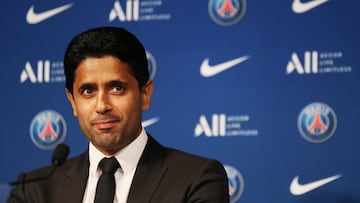UEFA CHAMPIONS LEAGUE
What is the link between PSG, QSI and Braga, Real Madrid’s Champions League opponents?
The Portuguese club are member owned and vastly different to the Ligue 1 champions in many ways, but that hasn’t put Qatar off.

Multi-club ownership has been around in elite-level soccer for a while and doesn’t appear to be going away any time soon. Manchester City’s City Football Group is one of the highest-profile example, along with the Red Bull teams (Leipzig and Salzburg). Earlier this year, Chelsea owners BlueCo acquired a majority stake in French club Strasbourg. Not wanting to be left out, Paris Saint-Germain also got involved in October 2022, taking over 21.7% of Sporting Club de Braga, who will face Real Madrid in the Champions League on Tuesday. This month, they upped their stake to 29.6%.
PSG owners QSI investing in Braga from the bottom up
From the outside, it might appear PSG’s Qatari owners, Qatar Sports Investment (QSI), are simply controlling the Portuguese club’s finances from behind the scenes. However, club president Antonio Salvador has revealed they are also helping out in additional ways.
Nasser Al Khelaïfi and his team have implemented improvements in Braga’s marketing, connections and scouting network, as Aaron Barton, who founded Portuguese soccer website Próxima Jornada, tells the BBC. QSI have also helped the club open a new state-of-the-art training complex in recent weeks, with Al Khelaïfi present at its inauguration.

Qatar has taken steps to develop the club’s entire infrastructure rather than simply throw money at the first team, hoping they can eventually become regular challengers to Portugal’s “big three” of Sporting, Benfica and Porto. But Barton explains: “They are not [fully] funded by QSI. As far as Braga are concerned, they have made their money through player sales - and until now have not put much back into the club.”
Why will Braga never become “the next PSG”?
Journalist Tom Kundart, who runs the PortuGOAL website, also spoke to the BBC and insists QSI will never be able to Braga into “the next PSG” due to the club and city’s size and status. In any case, UEFA regulations prevent organisations or individuals from owning majority stakes in more than one club, which means Qatar would have to sell PSG to take full control of the Portuguese club.
As Kundart puts it, there is little chance of Braga becoming “a get-out clause” for Al Khelaïfi and his crew because there is limited potential for the club, based in a city of just 200,000 inhabitants, to grow. Unlike PSG, the only top-level team in one of the biggest capital cities in Europe, Braga will never become a “super club”.
Like in Germany, the culture of fan ownership in Portugal would present another significant obstacle. Whereas in England or France “you can wave your notes and become the owners,” Portuguese clubs are member owned and those members would have to approve any large-scale changes. Realistically, that is unlikely to happen, one of the main reasons why Chelsea’s recent rumoured interest in acquiring a stake in Sporting failed to go any further than that.

Braga’s modest transfer strategy in stark contrast to PSG’s
Braga and PSG are also chalk and cheese when it comes to the transfer market. Whereas the French club have splashed the cash lavishly over the last decade or so, the Portuguese club’s recent success has come in a much more measured way. They have spent little on new players, instead focusing on bringing players through their academy and recruiting youngsters who have been let go by Portugal’s “big three”.
In recent seasons, they have been able to move players on for sizeable transfer fees but have held on to the bulk of the money, leaving them with a bank balance that is the envy of other clubs around Portugal. This summer, knowing they would be guaranteed a hefty sum thanks to their qualification for the Champions League group stage, they signed former Sporting, Galatasaray and PSV winger Bruma from Fenerbahçe for a fee of €6.5 million ($6.9 million), the third most expensive signing in their history.






